|
August 23, 2021- No. 73
Health Care Crisis Requires Human-Centred Solutions
Alberta Nurses Say No! to
Imposition of Emergency Powers
- Peggy Morton - 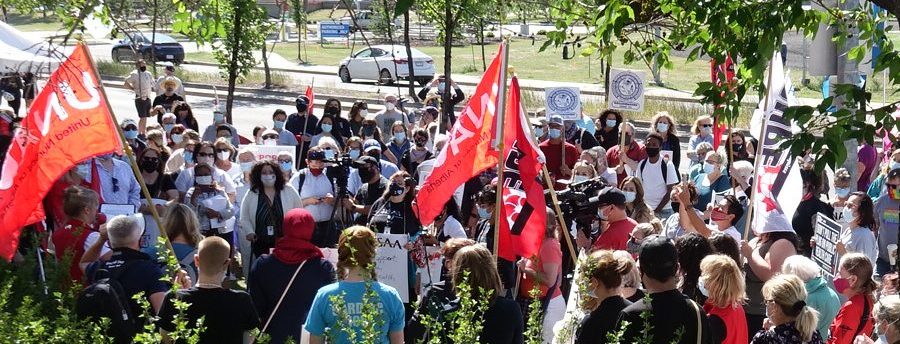
United Nurses
of Alberta Day of Action, August 11, 2021, Edmonton
• BC Nurses Demand Solution to Staff Shortages
Health Care Crisis Requires Human-Centred Solutions
- Peggy Morton - 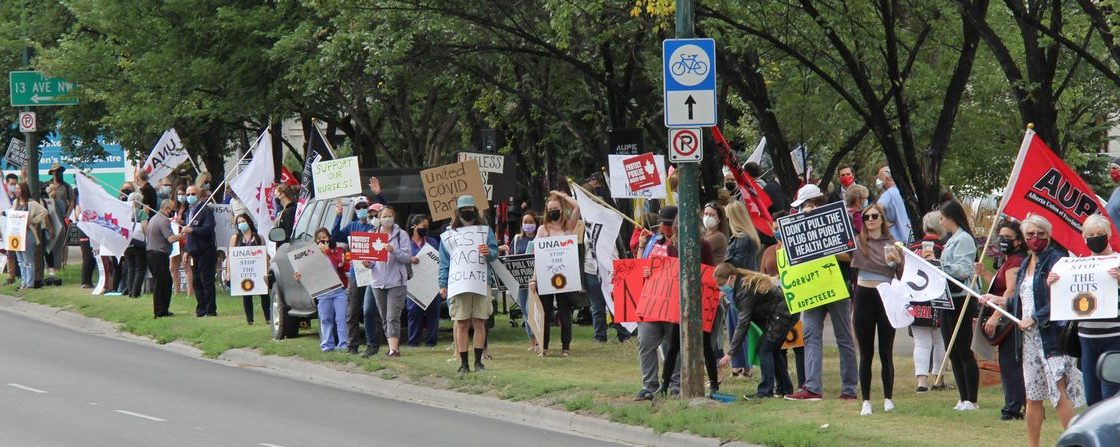
United Nurses of Alberta Day of Action, August 11, 2021, Calgary
United Nurses of Alberta (UNA) was informed by Alberta Health
Services (AHS) on August 20 that it would once again invoke the
emergency provisions of its collective agreement with UNA to solve
"significant staffing issues."
AHS Senior Negotiations and Labour Relations Advisor Rick Mann
informed UNA in an email on August 21 that it will redeploy nursing
staff, mandate overtime and cancel scheduled vacations to ensure
staffing of intensive care units, emergency departments and other
units, UNA informs on its website. "Further to our previous
notifications that we would be using the emergency provisions of the
collective agreements, we want to let you know that the situation has
progressed and created additional pressures throughout the healthcare
system, with the most impacted areas at this time being the Edmonton
and South Zones," Mann's email said.
The AHS spokesman stated that "AHS is feeling pressure due to
increasing occupancy, acuity and staff absences."
UNA Labour Relations Manager David Harrigan responded that UNA does
not believe the current situation meets the definition of emergency
under the collective agreement. The UNA collective agreement says, "An
emergency is an unforeseen combination of circumstances or the
resulting state that calls for immediate action. A situation is not
an emergency if it results from a reasonably foreseeable combination of
circumstances or if reasonable remedial steps could have been or can
still be taken to deal with the circumstances."
Harrigan noted that "most medical professionals in Alberta have
foreseen the problems now faced by AHS arising from a chronic shortage
of nursing staff in Alberta health care facilities and the pressures of
the fourth wave of the COVID-19 pandemic that were sure to arrive when
the government and public health officials rushed to reopen the
province too soon last month."
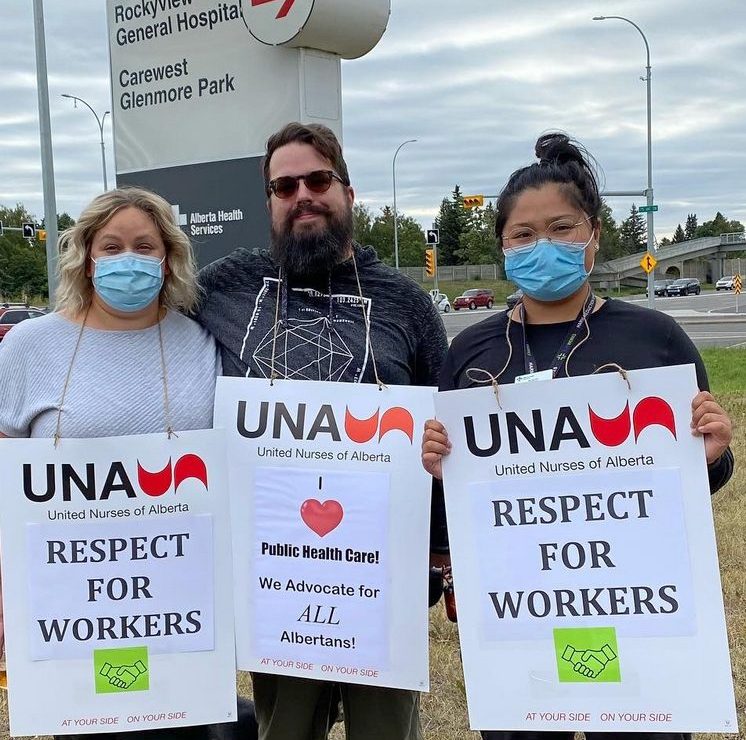 Jason
Kenney declared the pandemic over in July. This was followed by the
reckless decision to cancel COVID-19 testing and eliminate quarantine,
an announcement that was met with a storm of opposition and daily
rallies, forcing the Kenney government to take a step back and announce
that it was postponing these measures. But instead of
heeding the demands of health care workers including UNA and experts in
infectious diseases to put proper measures in place to deal with the
fourth wave, the government is again using its preferred option of
arbitrary force and dictate under the guise of an "emergency." The
government has not only failed to hire more nurses, but is sticking to
its
plan to eliminate some 750 registered nursing positions. The use of
"emergency powers" is actually making the crisis worse, and is being
militantly opposed by nurses across Canada and Quebec. Nurses point out
that forcing exhausted nurses to work more overtime, denying vacations
and imposing forced redeployment leads to more nurses
becoming sick and unable to work, and more nurses deciding to resign
their positions. Jason
Kenney declared the pandemic over in July. This was followed by the
reckless decision to cancel COVID-19 testing and eliminate quarantine,
an announcement that was met with a storm of opposition and daily
rallies, forcing the Kenney government to take a step back and announce
that it was postponing these measures. But instead of
heeding the demands of health care workers including UNA and experts in
infectious diseases to put proper measures in place to deal with the
fourth wave, the government is again using its preferred option of
arbitrary force and dictate under the guise of an "emergency." The
government has not only failed to hire more nurses, but is sticking to
its
plan to eliminate some 750 registered nursing positions. The use of
"emergency powers" is actually making the crisis worse, and is being
militantly opposed by nurses across Canada and Quebec. Nurses point out
that forcing exhausted nurses to work more overtime, denying vacations
and imposing forced redeployment leads to more nurses
becoming sick and unable to work, and more nurses deciding to resign
their positions.
UNA also recently brought to light that private agencies are trying
to recruit nurses at higher rates than nurses are paid working for
Alberta Health Services. Despite the fact that AHS negotiators
confirmed the use of third party recruiters to UNA on August 11, the
Alberta government is also making the ridiculous and baseless claim
that UNA
is "bargaining in bad faith" by informing Albertans about what the
government is up to. This certainly shows their desperation to cover
their tracks as more and more people join in actions in support of the
demands of nurses and other health care workers.
UNA recently held a very successful Day of Action across the
province, and nurses joined by other health care workers, workers from
other sectors, seniors, women, and youth and students on their picket
lines. The strong spirit and determination to uphold their rights and
in this way do their duty to their patients was evident everywhere.
Human-centred solutions are needed which safeguard the health and
well-being of the nurses, not attacks which lead to more illness and
nurses resigning their jobs. Workers' Forum calls on all the workers to continue to provide all-out support for the demands of the nurses. 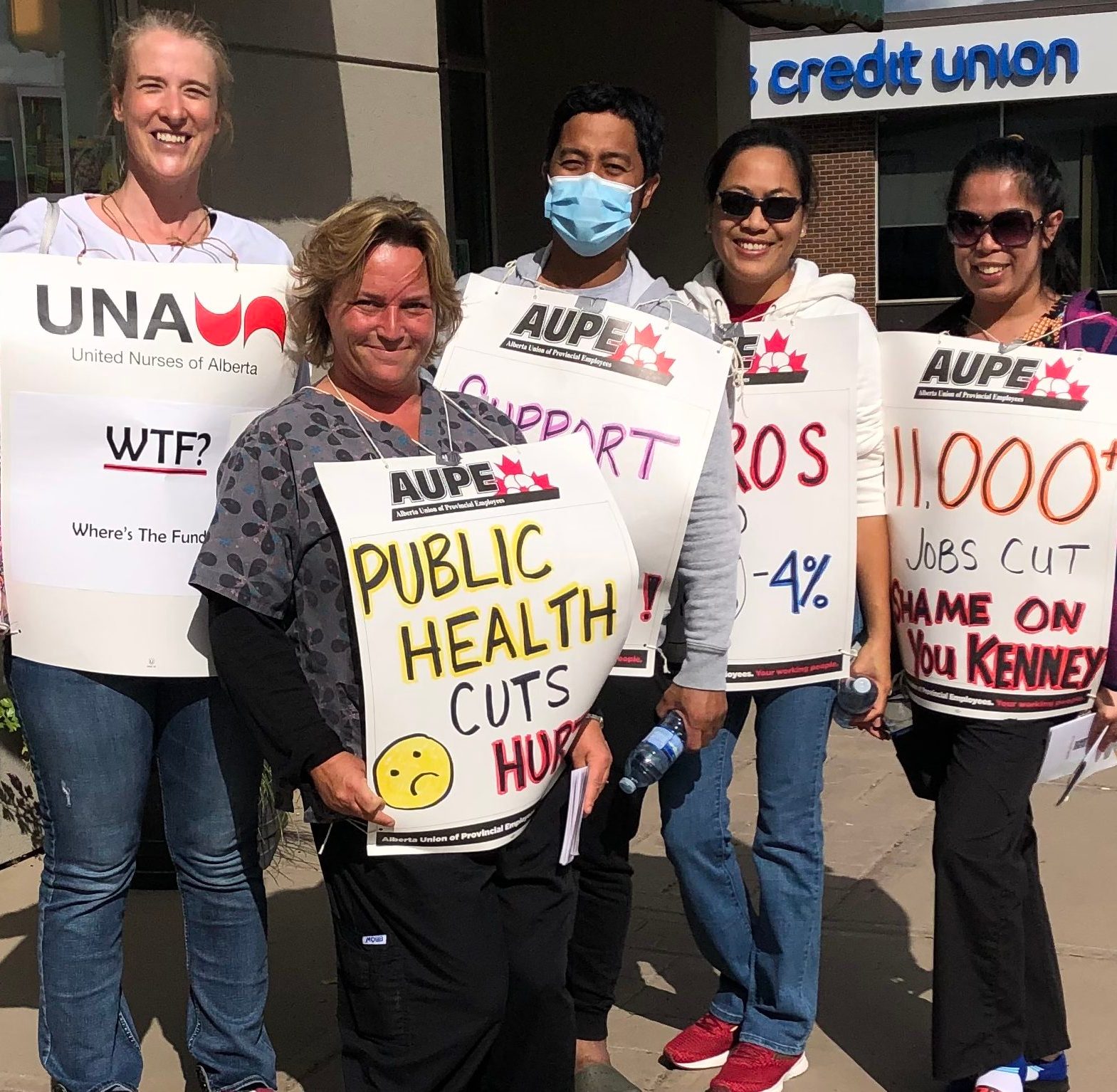 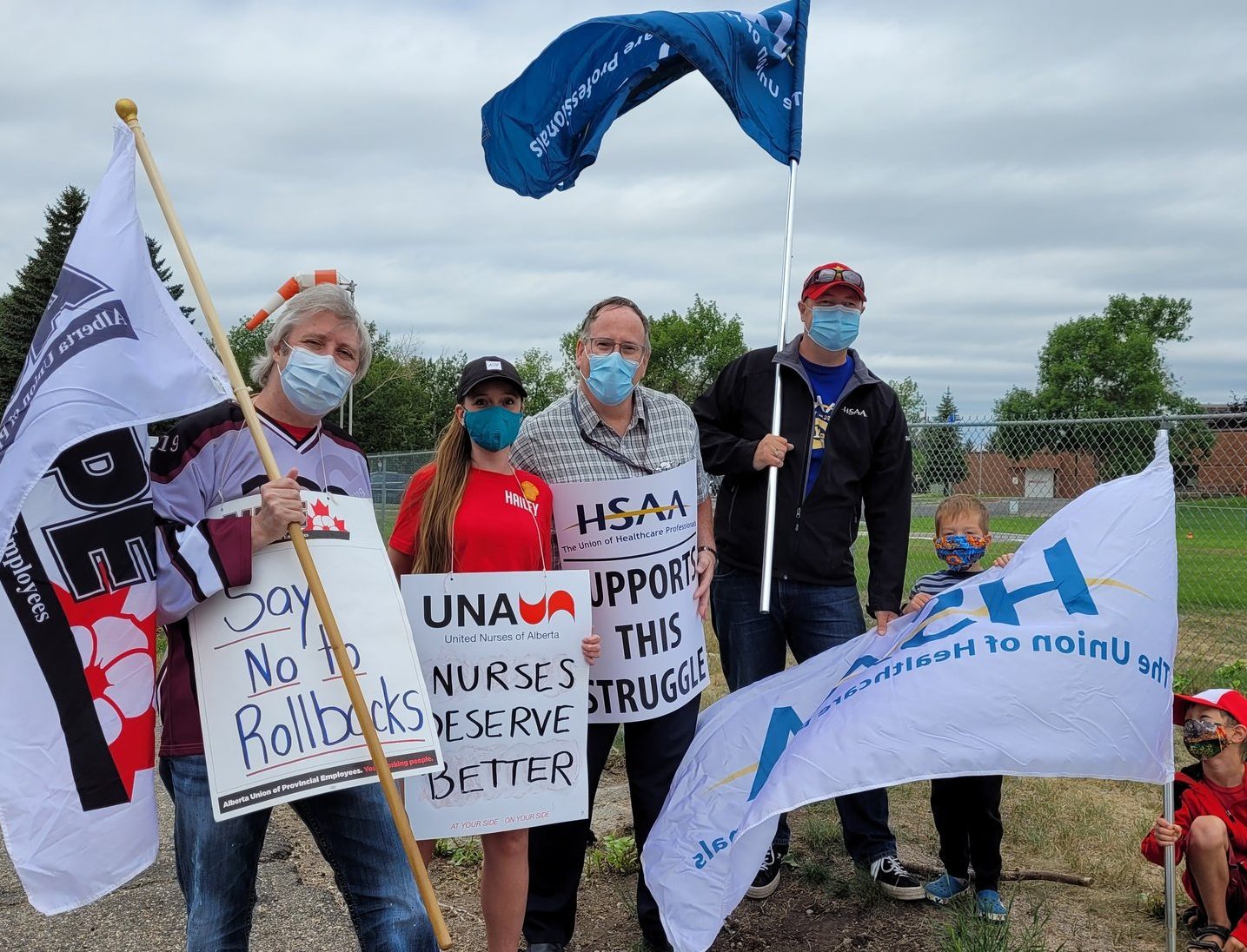 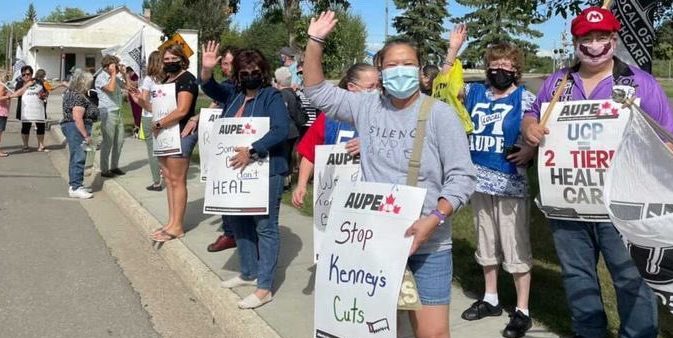
UNA day of action August 11, 2021

BC nurses are leaving their jobs in unprecedented numbers. The CBC
reported on August 20 that about two-thirds of the emergency room
nurses at Royal Inland Hospital in Kamloops in the BC Interior had quit
due to stress and burnout in recent months. Nurses throughout the
province report working short-staffed on a daily basis.
Throughout the province registered nurses, licensed practical nurses,
care aides and others are leaving their jobs because the strain on
their physical and mental health and the consequences for their
families are more than they can cope with.
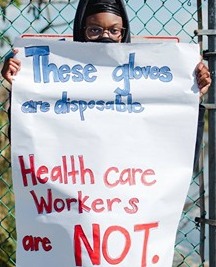 The
failure of the government and the Health Authorities to address the
staffing crisis is not just a matter of workers being stressed,
overworked and burned out, as if that was not criminal enough. The
greatest concern of the workers is that without enough staff, patient
care is jeopardized. In speaking to CTV on August 13 a spokesperson for
the Canadian Federation of Nurses Unions reported that "nurses and
health-care staff are overworked, underpaid, burnt out, and suffering
moral distress because there are not enough staff to provide the care
patients deserve." The
failure of the government and the Health Authorities to address the
staffing crisis is not just a matter of workers being stressed,
overworked and burned out, as if that was not criminal enough. The
greatest concern of the workers is that without enough staff, patient
care is jeopardized. In speaking to CTV on August 13 a spokesperson for
the Canadian Federation of Nurses Unions reported that "nurses and
health-care staff are overworked, underpaid, burnt out, and suffering
moral distress because there are not enough staff to provide the care
patients deserve."
Doctors and nurses are leaving their professions as
a result, many reporting that they are exhausted and completely
demoralized by the government's declaration that instead of measures to
support them they are being asked to work longer and harder,
particularly with the government's program of increased surgeries. One
nurse commented that the Minister of Health should "walk a mile in our
shoes." An increase in surgical procedures, which health care workers
know is needed, without addressing the problems of lack of staff and
untenable working conditions, is putting health care workers and the
care of the public at even greater risk than is already the case.
This is the situation that the people of BC are facing: certain
areas, particularly the Interior, are experiencing an upsurge in
COVID-19 cases at the same time as thousands of people have been
evacuated and many more are under evacuation alerts due to wildfires.
On August 21 the province reported over 4,000 properties under
evacuation
orders and over 18,000 on evacuation alerts. Besides the evacuation of
private homes and businesses, residents of long-term care homes in five
interior communities have been evacuated, most to other homes in the
region but at least 100 flown to Vancouver.
The health care system in BC is in crisis. The system was in a
staffing crisis before the pandemic, the shortage of staff meaning that
workers were required to work excessive amounts of overtime and often
work short-handed. The increased demands on nurses and all other health
care workers in the conditions of the pandemic have not led health
authorities to take any measures to address the problem of staffing. In
fact, recent decisions have made the overwork much worse, with the BC
Nurses' Union reporting that some nurses are being mandated to work
24-hour shifts.
 The
Ministry of Health, despite objections from health care workers,
continues to insist that surgeries be increased, what they call a
surgical renewal program, in spite of the strain on surgical teams
whose work is much more strenuous and difficult because of the need for
additional PPE and enhanced sanitation requirements to protect against
COVID-19. The
Ministry of Health, despite objections from health care workers,
continues to insist that surgeries be increased, what they call a
surgical renewal program, in spite of the strain on surgical teams
whose work is much more strenuous and difficult because of the need for
additional PPE and enhanced sanitation requirements to protect against
COVID-19.
When responding to questions from CTV on whether it was unrealistic
to pursue the surgical renewal program at this time Health Minister
Adrian Dix responded in a cavalier fashion, that "This is a really
difficult time for everyone and we're doing our best to support people
by delivering the services, especially the surgical services that
people
in BC expect and deserve," ... "It is, of course, a challenge to meet
the increasing demands of a society that is growing and that is aging,
but I think we've done an exceptional job." Chief Medical Officer Dr.
Bonnie Henry, after acknowledging the fact that doctors, nurses and
others have been under extreme pressure due to the pandemic and that
many are quitting, said "I know from my personal experience in
pandemics and crises we've seen that go on and on, it is not surprising
to see people burnt out," ... "We all want this to be over. We all
wanted this to be over last summer and we have to deal with the
reality."
Health care workers throughout the country have repeatedly pointed
out that words of praise and thanks for all their hard work do not
solve the problem of the staffing crisis. If the government and health officials were serious about
"dealing with the reality" they would not only listen to health care
workers
but they would follow their lead in terms of what is needed to address
the problem of recruitment and retention of staff, ensuring working
conditions that respect the dignity and rights of the workers and the
patients in their care and vastly expanding training programs for new
workers to enter the field. Health care workers are speaking out and
presenting solutions and demanding they be implemented. Treating
workers as disposable, as "things" that can be pushed beyond the
limits, and not as the human factor that is essential to address the
problems of the health care system, is not a solution.

(To access articles individually click on the black headline.)
PDF
PREVIOUS
ISSUES | HOME
Website: www.cpcml.ca
Email: office@cpcml.ca
|

